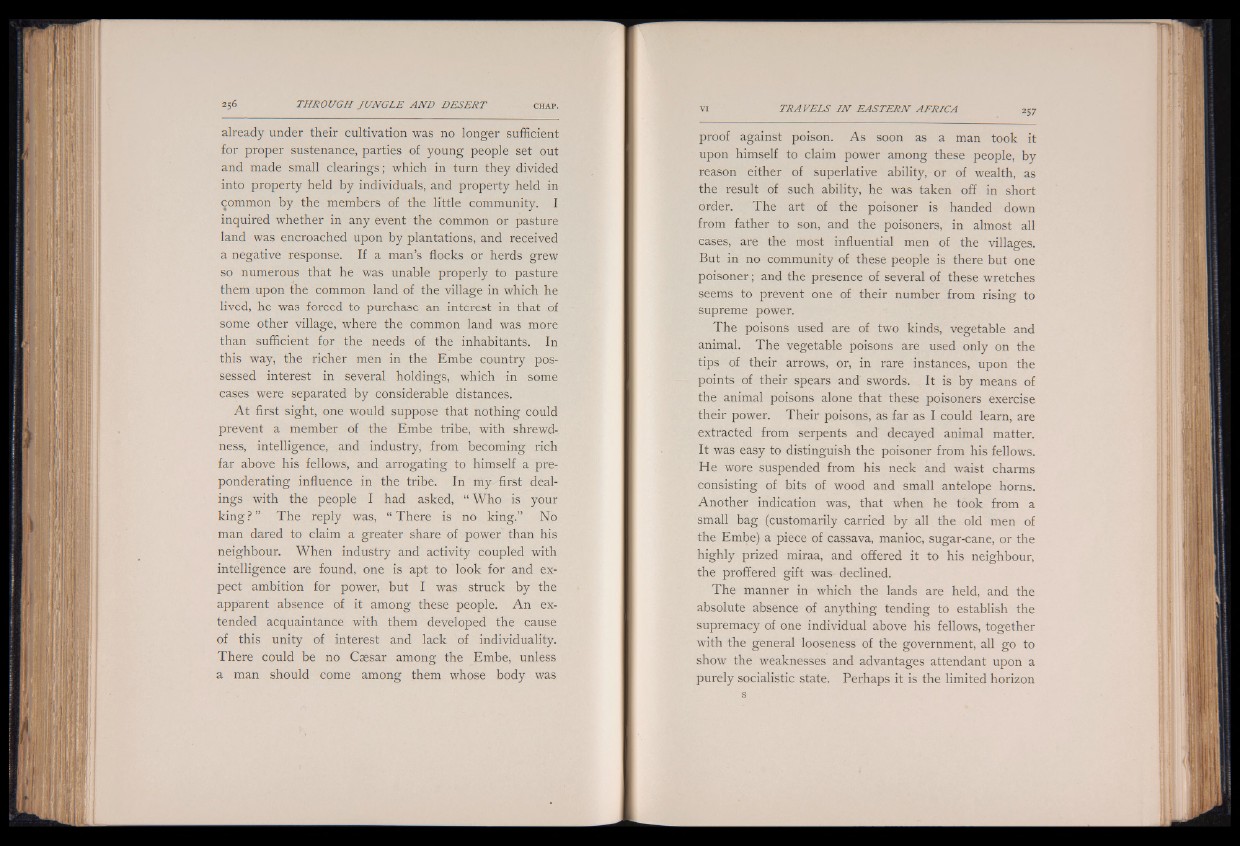
already under their cultivation was no longer sufficient
for proper sustenance, parties of young people set out
and made small clearings; which in turn they divided
into property held by individuals, and property held in
common by the members of the little community. I
inquired whether in any event the common or pasture
land was encroached upon by plantations, and received
a negative response. If a man’s flocks or herds grew
so numerous that he was unable properly to pasture
them upon the common land of the village in which he
lived, he was forced to purchase an interest in that of
some other village, where the common land was more
than sufficient for the needs of the inhabitants. In
this way, the richer men in the Embe country possessed
interest in several holdings, which in some
cases were separated by considerable distances.
A t first sight, one would suppose that nothing could
prevent a member of the Embe tribe, with shrewdness,
intelligence, and industry, from becoming rich
far above his fellows, and arrogating to himself a preponderating
influence in the tribe. In my-first dealings
with the people I had asked, “ Who is your
king ? I The reply was, “ There is no king.” No
man dared to claim a greater share of power than his
neighbour. When industry and activity coupled with
intelligence are found, one is apt to look for and expect
ambition for power, but I was struck by the
apparent absence of it among these people. An extended
acquaintance with them developed the cause
of this unity of interest and lack of individuality.
There could be no Caesar among the Embe, unless
a man should come among them whose body was
proof against poison. As soon as a man took it
upon himself to claim power among these people, by
reason either of superlative ability, or of wealth, as
the result of such ability, he was taken off in short
order. The art of the poisoner is handed down
from father to son, and the poisoners, in almost all
cases, are the most influential men of the villages.
But in no community of these people is there but one
poisoner; and the presence of several of these wretches
seems to prevent one of their number from rising to
supreme power.
The poisons used are of two kinds, vegetable and
animal. The vegetable poisons are used only on the
tips of their arrows, or, in rare instances, upon the
points of their spears and swords. It is by means of
the animal poisons alone that these poisoners exercise
their power. Their poisons, as far as I could learn, are
extracted from serpents and decayed animal matter.
It was easy to distinguish the poisoner from his fellows.
He wore suspended from his neck and waist charms
consisting of bits of wood and small antelope horns.
Another indication was, that when he took from a
small bag (customarily carried by all the old men of
the Embe) a piece of cassava, manioc, sugar-cane, or the
highly prized miraa, and offered it to his neighbour,
the proffered gift was declined.
The manner in which the lands are held, and the
absolute absence of anything tending to establish the
supremacy of one individual above his fellows, together
with the general looseness of the government, all go to
show the weaknesses and advantages attendant upon a
purely socialistic state. Perhaps it is the limited horizon